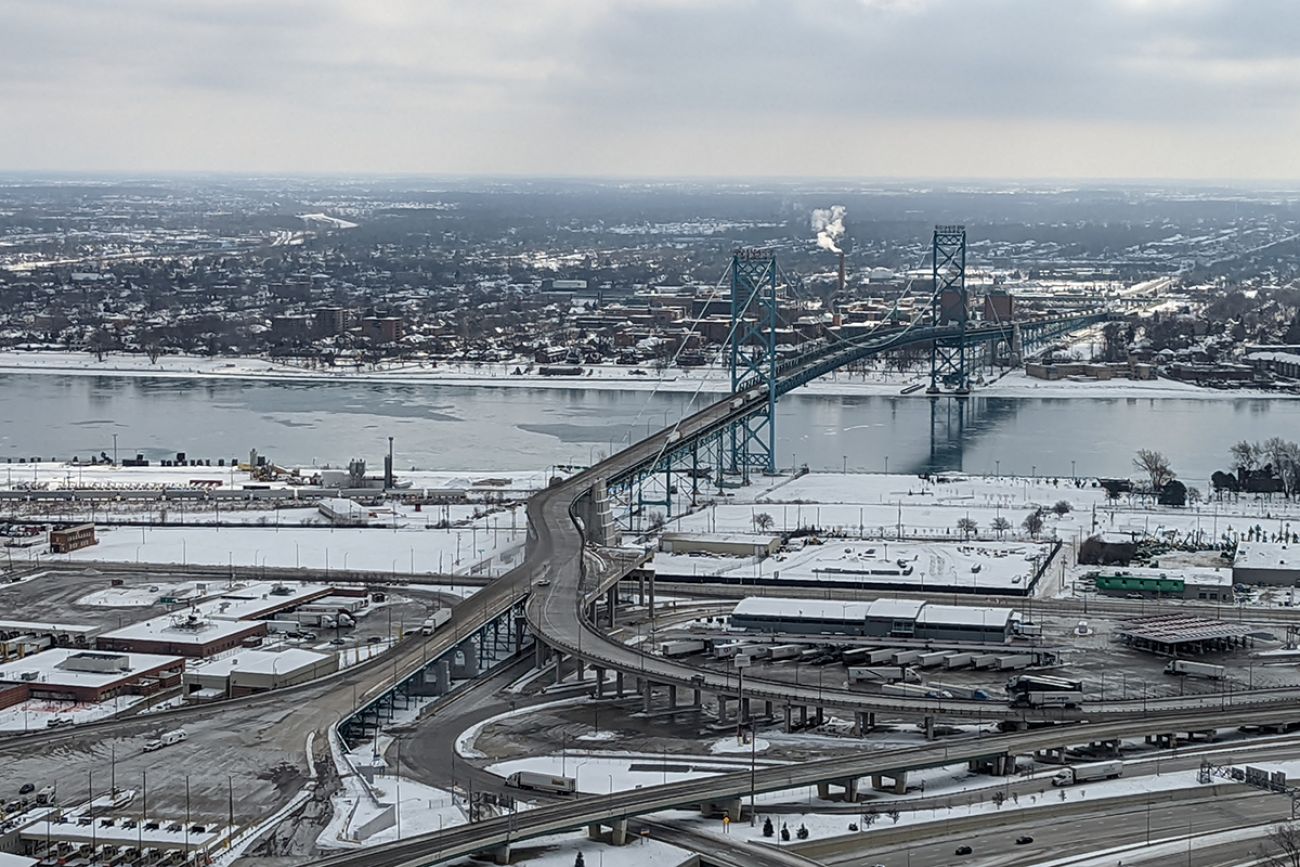Michigan in ‘bull’s-eye’ of tariff fight, Canadian official warns

- Michigan businesses, consumers holding off on big investments amid tariff uncertainty, economic experts report
- Michigan’s close trade relationship with Canada makes the state especially vulnerable to repercussions from trade wars
- Officials on both sides of the border expressed optimism that Trump, Carney could reach a truce on trade
High tariffs and economic uncertainty triggered by tensions with Canada and other major US trading partners have businesses and consumers alike holding off on big purchases or investments, according to experts who say those trends could spell trouble for Michigan.
Sweeping taxes on Canadian imports were 19 times higher in April than they were in January, and April exports of vehicles to Canada were the lowest they’ve been since auto plants were shut down during the initial COVID-19 outbreak in 2020, according to research compiled by Michigan State University professor Jason Miller.
Some of the steep decline could be a result of companies front-loading exports in March to get ahead of higher tariffs, Miller said Tuesday. But for many companies, the tariff whiplash has prompted pauses in hiring, a reluctance to expand and less product variety as they wait for more long-term clarity.
“We don't know what's going to happen a month from now, two months from now, two years from now,” Miller said. “The uncertainty is causing everybody to freeze in place to try to see what is going to happen.”
President Donald Trump has relied heavily on tariffs since taking office a second time in January, claiming the strategy would rectify global trade imbalances, benefit domestic industries and raise funds to reduce the national deficit.
Trump and his allies suggest the strategy is working, pointing to planned investments like General Motors’ $4 billion announcement to shift some production from Mexico to the US, including at the automaker’s Orion Township plant.
But affected countries have responded in kind, slapping tariffs on US goods and taking other retaliatory measures while working to negotiate new terms.
Related:
- Trump tariffs jolt Michigan: businesses eye cuts; shoppers tighten belts
- As lawmakers prep budget, economists warn tariffs may cost Michigan 13,000 jobs
- Trump tariffs spark ‘trade war’ with Michigan’s biggest trade partners
Critics contend the back-and-forth with major trading partners is driving up production costs for businesses and threatening key trading partnerships, particularly in Michigan, a border state that’s long been a major trade corridor between Canada.
Michigan’s close relationship with Canada through the auto industry and other economic sectors puts the state “at the bull’s-eye of potential negative impact from tariffs,” Colin Bird, consul general of Canada in Detroit, said during a panel discussion hosted by Michigan State University Tuesday.
“If you put a giant tariff wall down the middle of the Great Lakes…you are disrupting an ecosystem that has been at the core of Michigan prosperity for over a century,” he continued.
Consumer trends
Economists have projected Michigan could lose out on 13,000 jobs across the next five years due to auto, steel and aluminum tariffs, though the state is still on track to add jobs at a moderate pace over the next few years because of growth in other sectors.
Despite those warnings, the state unemployment rate decreased slightly in May to 5.4%. Still, Michigan’s jobless rate remains one of highest in the nation and is well above the national rate of 4.2%.
Recent purchasing trends suggest consumers are pulling back. New US Commerce Department data showed a decline in retail sales last month, and the University of Michigan’s latest consumer survey showed increasingly negative views on economic conditions, personal finances and their own ability to keep stable employment.
Much of that shift was attributable to tariff uncertainty, particularly when the Trump administration temporarily imposed high “reciprocal tariffs” on several nations, Joanne Hsu, an associate professor and the Director of the Surveys of Consumers at the University of Michigan, told the state Senate Oversight Committee on Wednesday.
“Consumers were specifically citing unpredictability, instability, and the uncertainty around trade policy as weighing down their views,” Hsu said, later adding: “It is unlikely that consumers will be willing to continue spending through these negative views of the economy.”
One Michigan business owner told lawmakers on Wednesday that she’s already noticed a downturn in walk-in sales and customers’ willingness to spend on non-essential items.
“It's that threat of instability that's killing the flow,” said Karen Roofe, who owns two stores in Traverse City and serves as vice president of the Downtown Traverse City Merchant Association. “We're not cutting back to be lean. We're cutting back to survive.”
Nationally, manufacturing output increased slightly in May, largely due to higher domestic auto production, according to the Federal Reserve. But total industrial production unexpectedly fell.
A new national survey of home builders shows industry confidence declined sharply this month and is at its third lowest point since 2021.
Buddy Hughes, chair of the National Association of Home Builders, attributed the decline to elevated mortgage rates, along with "tariff and economic uncertainty."
Canada deal in reach?
Canada is Michigan’s largest international trade partner. The state imports more than $50 billion in Canadian goods annually, including crude oil, natural gas and raw materials, and exports $27.5 billion in goods.
Newly-elected Canadian Prime Minister Mark Carney and Trump met at the G7 Summit in Alberta this week, tentatively agreeing to pursue an updated trade deal within the next 30 days.
During comments at the Mackinac Policy Conference in late May, US Ambassador to Canada Pete Hoekstra — a former member of Congress and Michigan Republican Party chair — said he’s optimistic about US-Canada trade relations, calling recent tensions “pebbles in the shoes” that are unlikely to impede a long-term trade deal.
Interactions between Carney and Trump have given Hoekstra “a great deal of optimism” about next steps, he said at the time.
“They're both committed to growth,” he said. “I think both of them recognize that we have to move forward. We’ve got to get to an agreement on the trade deal.”
But Hoekstra also criticized some of the retaliatory measures Canadians have placed on US products, including stopping the sale of American alcohol or prohibiting US companies from bidding on certain government contracts.
“We've got some things that we need to work out, and we want to work out, but we're going to do that in a very, very constructive way,” he said. “This is not going to be…sitting in a room and hollering at each other, that's not the kind of relationship that we have.”
Windsor Mayor Drew Dilkens, who also spoke at the MSU panel this week, said he’s noticed that Canadians are slowing their travel to the US and are more hesitant to spend their money on US goods.
One benefit of the trade tensions, he said, was helping Canadians “develop a sense of national pride and unity that we haven’t had in our own country for a long time.”
Dilkens also expressed optimism that a trade deal could be reached, noting that undoing trade partnerships between Canada and Michigan would be like “trying to unscramble an egg.”
“We just hope that it's over sooner rather than later,” he said.
See what new members are saying about why they donated to Bridge Michigan:
- “In order for this information to be accurate and unbiased it must be underwritten by its readers, not by special interests.” - Larry S.
- “Not many other media sources report on the topics Bridge does.” - Susan B.
- “Your journalism is outstanding and rare these days.” - Mark S.
If you want to ensure the future of nonpartisan, nonprofit Michigan journalism, please become a member today. You, too, will be asked why you donated and maybe we'll feature your quote next time!




